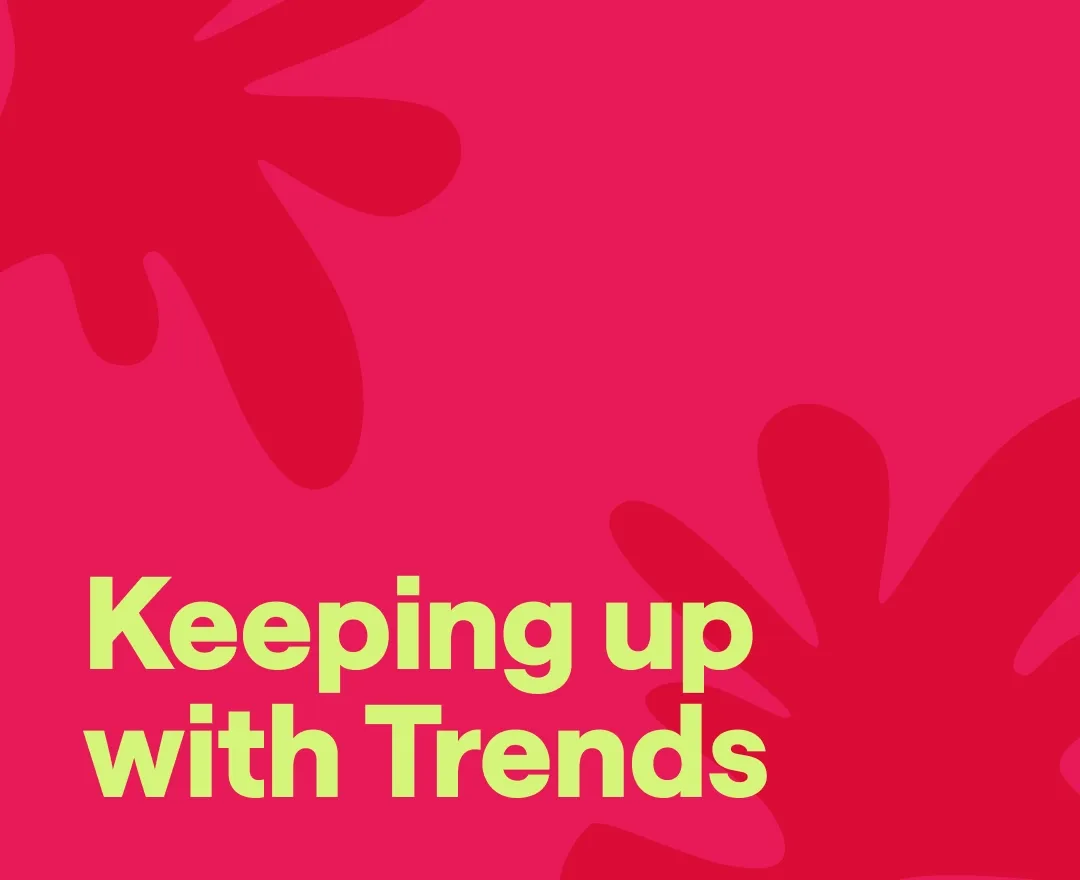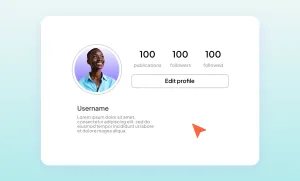Network! Join a community! Spot Google trends! Use social media daily!
These are all great, but these social media trends let you join the trend as one among the crowd. They don’t position you as the one starting the trend.
Social media is a major platform for podcasters to gain visibility and get more show listeners. A Spotify study revealed that 42% of the audience discover podcasts on social media channels like Facebook, TikTok, and Instagram.
However, social media is a tough game to master, and it requires you to stay at the forefront of trends. But how does one keep up with social media trends when they’re constantly changing?
Here are four ways to incorporate trend spotting seamlessly into your daily schedule (as a bonus, we’ve also included an action plan to help you make the most out of these trends.)
Why Become A Trendsetter?
Where’s the fun in jumping on a chewed-out trend? Your audience will probably scroll past your content, annoyed at many other creators doing the same thing repeatedly.
But what if you had been one of the early creators to join the trend?
Your engagement numbers would spike if only because of curiosity and if executed well, received credit for creativity.
When you track social trends, you can become a trendsetter and captivate viewers with fresh and relevant material. As a result, you drum up more audience interest, boost audience interaction with your content (even beyond social media), and get more visibility.
More importantly, you position yourself as a trend-forward leader and not just a follower.
Here's what Jason Hennessey, the Co-Founder of the digital marketing agency Hennessey Digital, says on the matter:
"It’s actually quite easy to spot social media trends and start using it for branding. But you have to follow a structured and even analytical approach to this. Because it’s not just about getting those likes. You’re gunning for the engagement. And putting strategy behind your effort to keep up with trends allows you to track what’s currently getting audience attention, understand its relevance to your own audience, and find out how to seamlessly incorporate it into your own content”
4 Ways To Spot Social Media Trends for 2025 Before Your Competitors Do
Include these four methods in your social media strategy to track social trends.
1) Search By Hashtags
You don’t have to spend hours browsing your competitors' feeds and analyzing different content. There’s a smart (yet quite underrated) way to stay on top of current social media trends for 2025: searching with hashtags.
‘Search by hashtags’ is a feature on Instagram, Twitter, and Facebook. Simply search with hashtags used in your industry or common ones like #WhatsNewOnSocialMedia or #SocialMediaUpdates to check for trends that are just gaining traction.
Instagram also optimized its search results by including the keyword search feature, a valuable tool for creators to explore and gain visibility. This feature enables you to search for specific keywords within your industry, making it easier to discover and be discovered by people interested in your niche.
Pro Tip: If you use keywords or hashtags to be more visible through Search, put them in the caption, and don’t hide them in the comments.
2) Use Social Listening Tools
There is no shortage of online tools to determine current social media trends, so use one.
The easiest answer to how to find social media trends is to turn to your audience for insight. Social listening tools let you in on what your audience is talking about in the comments, forums, review sites, and social media platforms.
Social listening tools can help you track your mentions, industry-specific hashtags, keywords, and relevant discussions. They let you actively monitor conversations about your niche-related social media topics and can collect massive amounts of data.
Analyzing this data will reveal current social media trends, themes, and common public sentiment. You can maximize these insights and make content reflecting your audience's recurring themes, emerging topics, or popular preferences, allowing you to craft content that they are truly interested in.
3) Test, Analyze, Reiterate
One of the best ways to stand out is to add your unique stamp of creativity to something you post. Here’s something you can try:
– Think of a unique angle for your brand
– Create and record original content (go all out on creativity)
– Launch and promote your content
– Engage and analyze feedback
After trying a few times, you’ll see and understand what your target audience likes from the results. Use this to guide your future content strategy.
This same strategy proved to be effective for eCommerce brand Tumble, a brand well-known for producing washable rugs:
“When Tiktok was just gaining traction as a social media platform, we tried everything. We shot product features, lifestyle videos, user generated content, but ultimately, what worked was simple–a combination of trending audio and showcasing the washability of our rugs by spilling random things on it. It was quick, fast-paced, it engaged audiences, and put our products front and center."
@tumblerugs
The analytics revealed what resonates with his audience — short, entertaining, trend-based videos, particularly those part of a challenge. Based on this knowledge, Tumble now tailored its TikTok content strategy to follow this formula and even applied the same approach to other platforms.
The best part of experimenting is that you don’t need to invest in additional tools. Almost all social media platforms provide unique resources to help you explore and create original content. For example:
– TikTok’s creative center offers video editing tools, templates, innovative tips, and insights to make their content stand out.
– Creator Studio for Instagram and Facebook lets users manage posts, reels, and all content in one place with scheduling and monetizing options. You also get detailed analytics to see what works and what doesn’t.
– Twitter Analytics lets you monitor your tweet performance on X. The resource can also help you understand your target demographics and engagement metrics, enabling you to create impactful content with a tailored strategy.
– YouTube Analytics on YouTube’s dashboard will feed your growth strategy. The four tabs (Overview, Content, Audience, and Research) give users insight into everything related to your content, from views and engagement to subscriber growth.
These resources alone will reveal the content your audience naturally favors, giving you direction in your content ideation process.
Create New Trends With Trending Audio
If you spend a lot of time scrolling through social media, you’ll notice that certain audio tends to get used a lot. Pay close attention to why people are using these sounds, formats, and versions. Here are some tips for choosing audio with the potential to trend:
1) Instagram Reels
On Instagram, go to the Explore page to scroll through different reels to see what is trending. You can click on the audio and “save audio” to use it later.
2) TikTok Videos
For TikTok users, it’s easy to spot trending audio on the app’s “For You Page.” Just paying attention to what creators and pages are using often.
3) YouTube Shorts
YouTube's "Shorts," which allows users to create short-form TikTok-like videos, can also help you find popular sounds. Check these daily to see if anything catches your eye or captures your ears.
Pro tip: You can also use YouTube to find relevant hashtags for full-length videos or shorts. Cross-check these hashtags with TikTok’s Creative Center to determine what is trending and relevant.
5-Step Action Plan for Harnessing Trends
As promised, we’ve created a straightforward five-step action plan to help you get started using the trends you discover.
- Identify trends: Monitor social media platforms, news sites, and industry blogs for emerging trends for 30 minutes daily. Mark your content calendar to remember specific days to jump on potential trends and plan timely episodes.
- Create content: Spend a dedicated hour twice or thrice a week to create content. Develop a workflow for quickly producing trend-related content, including brainstorming sessions, scripting, recording, and editing.
- Schedule and post content: Use social media management tools to schedule your posts. Engage with your audience before and after posting to increase your post's visibility.
- Start a conversation: Use your social media presence to start conversations using a dedicated hashtag around new trends or challenges related to your podcast’s niche.
- Evaluation: After releasing trend-related content, review analytics to assess performance. Use this data to refine your approach and improve future trend-based episodes.
Final Thoughts
Staying on top of trends is a big part of effectively marketing your own content –especially for podcasters and other creators who aim to increase traffic on their other platforms and remain relevant.
Adopting a structured and analytical approach to trend-spotting can help make content that lets you stand out. Be sure to incorporate trendspotting as a regular content strategy and consistently practice and create cool content until you find your own niche.
To make the content creation process quicker than ever before, don't forget to take full advantage of AI-powered platforms like Podcastle, which can help you reduce time spent editing by enhancing your audio to studio-quality, or upscaling your videos, at just the click of a button.
About the Author: Jason Hennessey

|
Jason Hennessey, an entrepreneur and SEO expert since 2001, has mastered Google's algorithm, leading to successful ventures in digital marketing. As CEO of Hennessey Digital since 2015, he's grown the company into a multi-million dollar enterprise, twice featured on the Inc. 5000 list. Jason shares his SEO wisdom through keynotes, his podcast, and his educational platform iloveseo.com |








